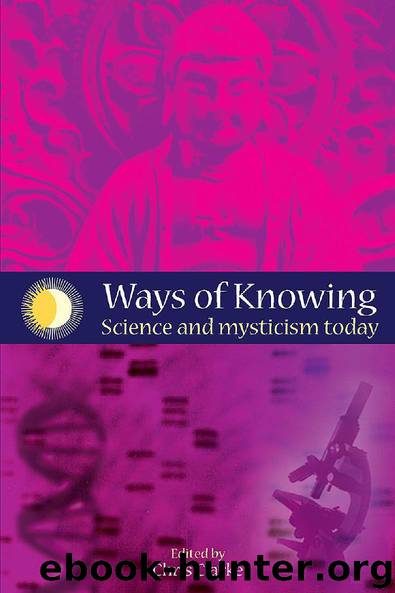Ways of Knowing by Chris Clarke

Author:Chris Clarke
Language: eng
Format: epub
Tags: Meaning, spirituality, perennial philosophy, mysticism, science, psychology, mathematics, religion, knowing, scientism, creativity, soul, physics, pluralistic universe, reality
ISBN: 9781845406837
Publisher: Andrews UK Limited 2013
Published: 2013-09-16T00:00:00+00:00
In this chapter, I have introduced a participatory spiritual pluralism as a more adequate metaphysical framework than the perennialism typical of most transpersonal works. If I have argued so forcefully for a multiplicity of spiritual liberations and ultimates it is because spiritual pluralism (1) is more consistent with my own participatory understanding of spiritual states of discernment, (2) affirms, supports, and legitimizes the largest number of spiritual perspectives on their own terms, (3) provides a more fertile ground for a constructive and egalitarian interfaith inquiry and dialogue, and (4) is more generous in terms of recognizing the infinite creativity of Spirit than other meta-perspectives, allowing, impelling, and catalyzing Spirit’s creative urges through human embodied participation. Although for these and other reasons my work emphasizes the metaphysical plurality of spiritual worlds, I should stress here that I do not believe that either pluralism or universalism per se are spiritually superior or more evolved. And it is now time to make explicit the kind of spiritual universalism implicit in the participatory vision.
There is a way, I believe, in which we can legitimately talk about a shared spiritual power, one reality, one world, or one truth. On the one hand, the discussion about whether there is one world or a multiplicity of different worlds can be seen as ultimately a semantic one, and metaphysically a pseudoproblem. On the other hand, a shared spiritual ground needs to be presupposed to make interreligious inquiry and dialogue possible and intelligible. After all, traditions do understand each other and frequently developed and transformed themselves through rich and varied interreligious interactions. The strict incommensurability of traditions needs to be rejected on logical, pragmatic, and historical grounds. Thus, it may be possible to talk about a common spiritual dynamism underlying the plurality of religious insights and ultimates. But let us be clear here, this spiritual universalism does not say that the Tao is God, that emptiness ( sunyata ) is structurally equivalent to Brahman, and similar, quite empty I believe, equations. And neither does it suggest the equally problematic possibility that these spiritual ultimates are different cuts, layers, or snapshots of the same pie. As I see it, the indeterminate nature of Spirit cannot be adequately depicted through any positive attribute, such as nondual, dual, impersonal, personal, and so forth. This is why, I believe, so many Western and Eastern mystics chose the so-called via negativa or apophatic language to talk about the Divine, and why such nonexperiential language was regarded by most traditions as closer to the Divine than any positive statement of its qualities.
The spiritual universalism of the participatory vision, then, does not establish any a priori hierarchy of positive attributes of the divine: Nondual insights are not necessarily higher than dual, nor are dual higher than nondual. Personal enactions are not necessarily higher than impersonal, nor are impersonal higher than personal. And so forth. Since the Mystery is intrinsically indeterminate, spiritual qualitative distinctions cannot be made by matching our insights and conceptualizations with any pregiven features.
Download
This site does not store any files on its server. We only index and link to content provided by other sites. Please contact the content providers to delete copyright contents if any and email us, we'll remove relevant links or contents immediately.
The Lost Art of Listening by Michael P. Nichols(7506)
Why I Am Not A Calvinist by Dr. Peter S. Ruckman(4153)
The Rosicrucians by Christopher McIntosh(3519)
Wicca: a guide for the solitary practitioner by Scott Cunningham(3177)
Signature in the Cell: DNA and the Evidence for Intelligent Design by Stephen C. Meyer(3138)
Real Sex by Lauren F. Winner(3022)
The Holy Spirit by Billy Graham(2952)
To Light a Sacred Flame by Silver RavenWolf(2823)
The End of Faith by Sam Harris(2741)
The Gnostic Gospels by Pagels Elaine(2530)
Waking Up by Sam Harris(2459)
Nine Parts of Desire by Geraldine Brooks(2368)
Jesus by Paul Johnson(2360)
Devil, The by Almond Philip C(2331)
The God delusion by Richard Dawkins(2308)
Heavens on Earth by Michael Shermer(2284)
Kundalini by Gopi Krishna(2184)
Chosen by God by R. C. Sproul(2164)
The Nature of Consciousness by Rupert Spira(2108)
